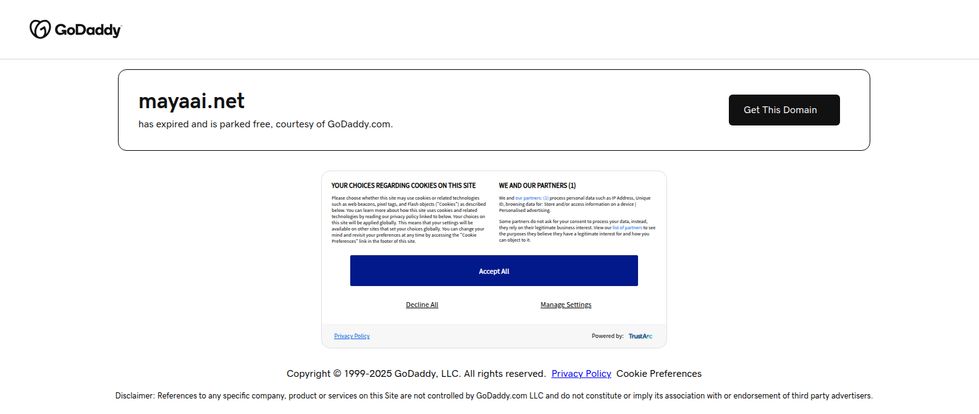You’ve been there. I’ve been there. We’ve all been there. You get a brilliant idea for a new project, you rush to your favorite registrar, and you type in the perfect domain name. And then… you see it. That soul-crushing page, maybe one like GoDaddy's, that says, “This domain has expired and is parked.” Or worse, “This domain is taken.”
Your heart sinks. But then a little button catches your eye: “Get This Domain.”
That little button is a gateway to a whole other world of the internet, a world I’ve been navigating for years: the domain aftermarket. It’s where domains aren’t just registered; they’re treated as assets. As digital real estate. And the biggest, busiest, most sprawling city in this digital landscape? It’s a platform called Sedo.

Visit Sedo
So, What is Sedo, Really?
Forget the textbook definitions for a second. In my experience, the best way to think of Sedo is like the Grand Central Station for domain names. It's a massive, bustling hub where millions of domains are bought, sold, and even rented out every single year. It’s been around since the early 2000s, which in internet years makes it practically ancient—and trust me, that longevity means something in this industry. They’ve seen it all, from the .com boom to the rise of the quirky .io and .ai TLDs.
It's a place where a solopreneur can find a forgotten gem for their new coffee shop, and a multi-national corporation can anonymously acquire a seven-figure domain for a new product launch. Sedo is the great facilitator in the middle of it all.
Breaking Down Sedo's Core Services
Sedo isn’t just a simple “for sale” board. It’s a suite of tools designed to cover nearly every aspect of domain trading. Let's get into the meat and potatoes.
The Domain Marketplace Itself
This is the heart of Sedo. With over 19 million domains listed for sale, it is, frankly, enormous. You can find everything here. One-word .coms that cost more than a house, clever brandable names, keyword-rich domains for SEO, and even domains with existing traffic. You can search, filter, make offers, or hit the “Buy Now” button if the price is right. It’s a bit like a stock market, an antique fair, and a real estate agency all rolled into one. The sheer volume can be overwhelming at first, but it also means there's a higher chance of finding exactly what you need, or a buyer for what you have.
Making Money While You Wait with Domain Parking
Okay, so you bought a few domains. You’re not ready to build websites on them yet. Are they just going to sit there collecting digital dust? Not with domain parking. Sedo allows you to “park” your domain on their servers, where they will display relevant ads. When a visitor clicks on one of those ads, you earn a small commission. It’s a Pay-Per-Click (PPC) model.
Now, let's be real. You're not going to get rich parking a random domain with zero traffic. But for domains that have some type-in traffic (people typing the domain directly into their browser) or expired domains that still get backlinks, it can generate a nice little trickle of passive income. It’s a great way to offset your annual renewal fees, and maybe even make a bit of profit while you wait for the right buyer to come along.
How Much Is Your Domain Actually Worth? Sedo's Appraisal
This is the million-dollar question, sometimes literally. Valuing a domain is more art than science. It depends on so many factors: length, TLD (.com is still king), brandability, existing traffic, comparable sales... the list goes on. Sedo offers a domain appraisal service that analyzes ten of these factors to give you a valuation. I've always felt these automated tools are a good starting point, a sanity check. But don't take it as gospel. The true worth of a domain is what someone is willing to pay for it. The appraisal gives you a data-backed starting point for your negotiations, which is a hell of a lot better than just picking a number out of thin air.
Need a Helping Hand? The Domain Brokerage Service
Let’s say you own a truly premium name, or you’re trying to acquire one from a stubborn owner. This is where you call in the pros. Sedo's brokers are experts in negotiation, valuation, and closing high-value deals. They can act on your behalf, providing anonymity and leveraging their industry connections. I’ve seen them close deals that seemed impossible. Sure, they take a commission, but for a six or seven-figure domain, their expertise is often worth every single penny. It’s the white-glove service of the domain world.
The Safety Net: Sedo's Escrow Service
Ever tried to buy something valuable from a stranger online? It can be nerve-wracking. How do you know they'll transfer the item after you pay? How do they know you'll pay once they transfer it? This is where an escrow service is non-negotiable. Sedo's Transfer and Escrow Service acts as a secure middleman. The buyer sends the payment to Sedo, the seller transfers the domain to the buyer. Once the buyer confirms they have control of the domain, Sedo releases the funds to the seller. It’s a simple, brilliant system that protects both parties and makes the whole process feel safe and professional. I would never do a private domain sale without one.
The Cost of Doing Business on Sedo
So, what's the catch? Well, it's not really a catch, just business. Listing a domain for sale on Sedo is generally free. They make their money when you make money. Sedo charges a commission on successful sales. The exact percentage depends on the type of sale, but as of my writing this, you can expect something like:
- 15% for sales through the Sedo marketplace.
- 10% if the domain is sold via their SedoMLS partner network (which gets your listing on other registrars like GoDaddy).
- 20% for sales of parked domains.
- A 3% fee for using just the Escrow service on a deal you arranged yourself.
Always check their official pricing page for the most current rates, as these things can change. But for the access to their massive market and the security they provide, I've always found their fees to be pretty reasonable.
Is Sedo Right for You? The Honest Truth
Look, no platform is perfect for everyone. Sedo is an incredibly powerful tool, but it's important to go in with the right expectations.
On one hand, the platform is incredibly simple and secure to use. The sheer size of the marketplace gives you unparalleled access to buyers and sellers. It’s a one-stop-shop for almost everything you could need in domaining. For serious investors, it's an indispensable resource.
However, you need to be realistic. Success isn't guaranteed. You can't just list `bobs-super-cool-blog.net` and expect to retire next week. The value of your domain is entirely dependent on market demand. Also, while the basic services are free to list, the premium ones like brokerage and appraisals come with fees. It's a professional platform with professional-level services and associated costs. If you’re just a hobbyist with one or two domains, the full suite of tools might be overkill. But if you're looking to actually make money or find that perfect digital address, Sedo is one of the best places to start.
Final Thoughts
After years in the SEO and traffic generation game, I’ve come to see domains as more than just web addresses. They are brands, traffic sources, and valuable digital assets. Sedo gets that. They've built an entire ecosystem around that idea. It's not just a list of names; it's a dynamic market built on expertise and security.
Whether you're a seasoned domain flipper or a business owner desperately searching for that perfect brand name that some one else is squatting on, Sedo is a platform you need to know about. It’s the established, reliable, and comprehensive powerhouse of the domain aftermarket. It might just have that perfect piece of digital real estate you’ve been looking for.
Frequently Asked Questions
Is Sedo legit and safe?
Absolutely. Sedo has been a leader in the domain industry since 2001. Their escrow service is specifically designed to make transactions safe for both buyers and sellers, ensuring money and domains are exchanged correctly. They are one of the most trusted names in the business.
How much does Sedo charge to sell a domain?
Sedo operates on a commission model. It's free to list a domain. If it sells, they take a percentage of the final sale price. This is typically 10% to 20%, depending on how and where the domain was sold (e.g., directly on the Sedo marketplace or through a partner registrar). Always check their site for the latest fee structure.
Can I really make money with Sedo domain parking?
Yes, but it depends heavily on the domain. You can earn money from clicks on ads displayed on your parked page. This works best for domains that naturally receive traffic, like expired domains with existing backlinks or common-word/phrase domains that people type in directly. It won't make you rich overnight, but it can be a good way to earn passive income and cover renewal costs.
What's the difference between Sedo and GoDaddy Auctions?
Both are major players, but they have different focuses. GoDaddy Auctions is heavily integrated with its own registrar and is the primary place for its expired domain auctions. Sedo is a more registrar-agnostic, global marketplace with a stronger focus on brokering high-value, privately-owned domains and a larger international footprint.
How long does a domain transfer with Sedo take?
The timeline can vary. Once the buyer pays and the seller initiates the transfer, it depends on the registrars involved. A push transfer between accounts at the same registrar can be almost instant. A transfer between different registrars typically takes 5 to 7 days. Sedo's team facilitates the process to ensure it goes as smoothly as possible.



